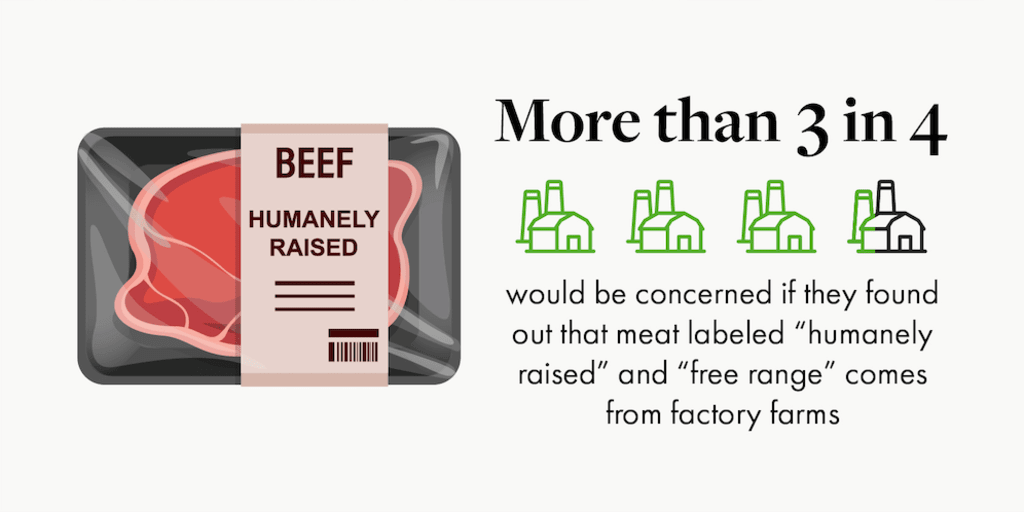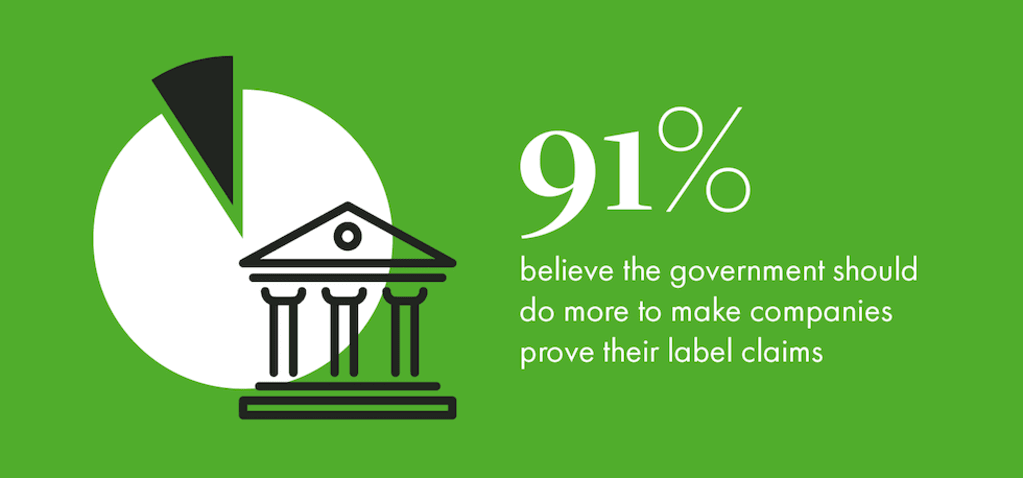US consumers would be concerned upon learning where meat really comes from
The results of a new survey of two thousand American shoppers reveal high support for the government holding meat companies accountable for their label claims, changing attitudes toward vegetarian and vegan diets, and how inflation may be impacting the shopper’s habits.
In October, Farm Forward commissioned a survey to learn more about consumers’ knowledge of and attitudes towards factory-farmed meat, plant-based foods, and other topics. Our interest in this survey is motivated by several questions about how people understand the food system and how current economic conditions impact their relationship with meat and other animal products. More specifically, we are interested in the following:
- How do American shoppers think about factory farming (i.e., what do they associate with it, and how ubiquitous do they believe it to be)?
- Is inflation impacting holiday meat habits?
- How do consumers think about different label claims (e.g., “humanely raised” and “sustainable”)?
- Have particular vegan and vegetarian stereotypes persisted?
- Do American shoppers believe more should be done to regulate label claims on meat products?
- The results provide insight into how American consumers think about the meat they pluck off the shelves, what they believe is true about it, what would concern them if they knew, and more.
Humanewashing Persists
At Farm Forward, we believe that humanewashing—meat companies’ attempt to mislead consumers about the realities of factory farming—poses a significant hurdle to building the kind of food system that aligns with the values of most Americans. Whether it’s industry-backed welfare labels like One Health Certified and American Humane Certified or ambiguous labels like “natural” and “sustainable,” we know there is a divergence between what these labels really mean and what consumers think they mean. Our 2021 consumer survey revealed as much, showing, for example, that 38 percent of consumers incorrectly believed that the label “cage-free” signifies that the animal was raised on pasture.
Results from this year’s survey show that humanewashing is alive and well. First, the vast majority of American shoppers (77 percent) claim that they know where the animal products they buy originate. When asked about specific labels, between roughly 40 and 50 percent of American shoppers claim to know what labels like “cage-free,” “free-range,” “humanely raised,” “natural,” and “sustainable” mean. Moreover, 71 percent say that they buy products with such labels, and half (50 percent) say that one reason motivating them to buy these products is that they sound more ethical.
However, the grim reality is that not only do labels like “natural,” “sustainable,” and others not mean an animal was, say, raised with constant access to the outdoors, they are virtually a guarantee that the animal was raised on a factory farm. Yet 78 percent of American shoppers say they’d be concerned if they found out animal products with these labels often come from factory farms; 76 percent say they’d be concerned if they found out that many of them don’t have legal definitions.

Lastly, 20 percent say they don’t think the meat they typically buy comes from animals raised on factory farms, with 22 percent saying they didn’t know. Factory farming is the rule and not the exception, so almost half of American consumers are either uninformed or incorrect about how meat is produced. Moreover, given the contradiction between their stated understanding of meat labels and the high degree of concern noted above, certifications and labels fail to accurately inform the public.
Shoppers do show some familiarity with the standard practices associated with factory farming; between roughly 30 and 50 percent associate the term “factory farming” with things like unsanitary and crowded conditions, methane emissions, caged animals, antibiotic usage, and pollution. But, bizarrely, even though so many would be worried if labeled meat products did come from factory-farmed animals, 63 percent of respondents claim to have positive feelings towards the term. This slightly contradicts other survey research showing low favorability for confined animal feeding operations (CAFOs) by registered voters. Public sentiment regarding factory farming deserves further study.
Increasing Appetite for Plant-Based Foods
Consumers also indicate interest in eating alternatives to factory-farmed meat. Sixty-seven percent and 58 percent of American consumers say they would eat cultured and plant-based proteins, respectively. While these percentages are unsurprisingly lower than the number of respondents who would eat animal meat (86 percent), that so many are open to other options is promising.
In the wake of high inflation and a widespread outbreak of avian influenza in turkey flocks throughout the US, turkey prices this Thanksgiving will be very high. In response to such price hikes, 64 percent of American shoppers say they might serve more plant-based dishes and less meat this holiday season. For holidays as historically meat-centric as Thanksgiving and Christmas, the idea that so many Americans might be willing to restructure their dinner tables is a sign that people may be open to new dishes and norms when faced with the fragility of the industrial animal agriculture system.
Further, the study revealed that many stereotypes of vegans and vegetarians persist with at least some of the population. Between 32 and 38 percent of shoppers believe certain stereotypes might be true, whether positive (e.g., they’re more compassionate) or negative (e.g., they don’t eat enough protein). Only 12 percent don’t think any stereotypes of vegans and vegetarians were true. However, while respondents may have their own preconceived notions, 72 percent of them agree that the past decade has changed how others view vegan and vegetarian stereotypes.
Support for More Accountability of Meat Companies
For years Farm Forward has raised about how meat companies and the federal government test and verify food labels—or don’t. Just as concerning is the body of evidence of antibiotic use in animal supply chains marketed as “raised without antibiotics.” Our own testing has further revealed a need for the USDA to require testing for meat with that label. American consumers align with Farm Forward on these issues; 80 percent believe that the federal government should do more to hold companies accountable for their label claims, and 91 percent believe they must make such companies prove that they’re taking steps to live up to their claims. These results align with a 2022 Data for Progress report, which shows that 82 percent of likely voters think that companies that “advertise that they’re switching to more humane products should be transparent about how they’re fulfilling their pledges.”
Nearly half (49%) of our survey’s respondents incorrectly think that if a meat product bears a “raised without antibiotics” label, it indicates that the product was tested for antibiotic residue. Unfortunately, the reality is that meat is almost never tested for antibiotic residue by the federal government. Seventy-four percent said they’d be concerned if they found out what we now know to be true: sometimes meat with the “raised without antibiotics” label contains antibiotic residue.

Conclusion
Virtually no meat sold in grocery stores lives up to consumer expectations for welfare or antibiotic use; very few farmed animals live on pasture, very few are tested for antibiotics, and the great majority spend their lives confined in small spaces. The vast market of certification labels—from “natural” to “sustainable”—broadly contributes to the clash between what consumers believe is true about most animal products and what is actually true. It isn’t reasonable to expect typical shoppers to make decisions consistent with their values when they must wade through a sea of misleading claims. Consumers have the right to expect truth in advertising, and producers must be held accountable for their humanewashing label claims.
Fortunately, even as humanewashing persists, American consumers agree with a call for more transparency and accountability among meat companies and are open to trying plant-based alternatives.
Learn more about humanewashing by signing up for our newsletter below, and test your knowledge of humanewashing with our quiz. See the full results, including some not mentioned above, at this link.
Survey Methodology
This random double-opt-in survey of 2,001 U.S. adults who are the primary grocery shoppers in their household was commissioned by Farm Forward between October 3 and October 17, 2022. It was conducted by market research company OnePoll, whose team members are members of the Market Research Society and have corporate membership to the American Association for Public Opinion Research (AAPOR) and the European Society for Opinion and Marketing Research (ESOMAR).